#if the conventions of the genre are used in a way that feels authentic to the characters then it'll never feel cheesy
Text
the thing about romcoms is just- it's never meant to be 'is it believable?' but instead 'do you believe it?' do you believe these two characters are actually falling in love with each other??? do you believe their chemistry??? do you believe whatever obstacle is thrown in their way is legitimately something that might keep them apart for a time and not something that could be solved with one conversation?? do you believe that they believe they need to fake date for this very specific reason??? do you believe the reason why they're 'enemies' at the start, no matter how silly a misunderstanding it may be??? do you believe the grand romantic gesture fits the characters and is actually how one character would show their love to the other?? like!!!! it's about empathy and authenticity and feeling what the characters feel so strongly that even if it's a trope or a cliché it doesn't matter because you believe it
#this is what separates a good romcom from a bad romcom for me#if the conventions of the genre are used in a way that feels authentic to the characters then it'll never feel cheesy#one of my biggest pet peeves is some of the romcoms of the last decade who have this real 'we're not like other romcoms' energy#where they try to act like they're Different and move away from the usual tropes but it's shit bc that's not the point!!!!#those tropes and conventions are staples of the genre for a reason#it's how you utilise them and incorporate them that matters#like fuck me i hate action movies but i know if i go see one there's a 99% chance there'll be a car chase scene#bc that's usually a staple feature of an action movie and i mean idc but that's fine bc i know it has a function in the story to increase#the tension#and even at that someone who really loves action movies could probably tell me the difference between a good car chase scene & a subpar one#in the same way that just saying something is fake dating doesn't automatically make it good#but if i believe it and i'm in it with the characters? oh boy i'm about to feel so dELIGHTED for the next 90 minutes thank you so much#anyway i'm rewatching the lost city and every second of this movie is so silly in a fun way and fantastical but oH BOY DO I BELIEVE IT#mine
88 notes
·
View notes
Text
jojo siwa claiming she's revitalizing gay pop and releasing 'karma' on the same night as conan gray's 'found heaven' and chappell roan's 'good luck babe' is so poetically ironic. it's like the universe WANTS to draw a comparison between jojo and queer pop artists.
the thing that makes queer pop compelling as a genre is the unique storytelling and experiences of queer artists told through their music. that doesn't necessarily mean every song by a queer artist has to be about their queerness. they don't have to scream "hey i'm gay!" in every single song they write. but claiming to be "reinventing gay pop" should mean you're telling interesting stories about your queer experience, right???
'found heaven' by conan gray is about growing up as a queer kid with religious guilt and disapproving parents. he equates being in love in an authentic way to "finding heaven", and the piece as a whole resonates with a TON of queer people in different stages of their lives. some people can look back at their childhoods and how much they've grown since then, some can relate because they're currently going through what conan's written about, and some people can sympathize with the way some queer people are treated, even if they aren't necessarily queer themselves.
'good luck babe' is a song about queerness and compulsory heterosexuality. chappell sings about a woman she was in a relationship with who decided to settle down in a conventional marriage despite being queer. the song reflects the denial a lot of queer people go through (specifically regarding the lesbian experience) and the unfortunate way a lot of them end up repressing who they are to conform to societal standards. it's fun, it's campy, but its message is still poignant.
as for karma… there's nothing inherently queer about that song. the music video for the original version, ‘karma’s a bitch’ by brit smith, featured a heterosexual storyline. jojo buying the rights to a song she didn't write isn't inherently a bad thing, a lot of mainstream artists do that all the time. however, if you're claiming to be a pioneer of the “gay pop” genre and your music doesn't reflect any queer themes or experiences, is it really “gay pop”? again, queer artists don't have to write exclusively about their queerness, but if you try to present yourself as a voice for the queer community without telling any of their stories, you're not going to be lauded as some revolutionary figure. if any of the songs on jojo’s album are actually about her experience as a lesbian or contain any queer themes, then i think she'd qualify as a “gay pop” artist. but so far, she's given us a faux edgy, generic pop song and tried to market it as some insane never-been-done-before feat. and honestly, if her entire album is like this and she continues to market herself this way, it's a slap in the face to all the genuine artists and storytellers in the queer community.
but let's stop talking about jojo siwa and start talking about the incredible queer artists who are truly breathing life into the "gay pop" genre: chappell roan, renee rapp, ben platt, conan gray, girl in red, kevin atwater, baby queen, mitski, clairo, dodie, and SO MANY MORE (feel free to add on some of your favourites because there are so many wonderful artists out there <3)
also: if you have a different perspective on this situation i would absolutely love to hear what you think and if you agree / disagree with this! i love discussing topics like this so feel free to reblog with your own take
#jojo siwa#karma#chappell roan#conan gray#queer pop#also the fact that this rebrand is a coverup for jojo's awful behavior#like be fucking fr#don't use the queer community as a sheild
661 notes
·
View notes
Text
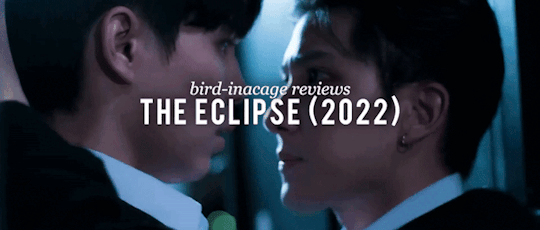
This is my quickie review on one of last year’s highly anticipated BL dramas and pairings. A really solid and competently directed entry to 2022′s roster.
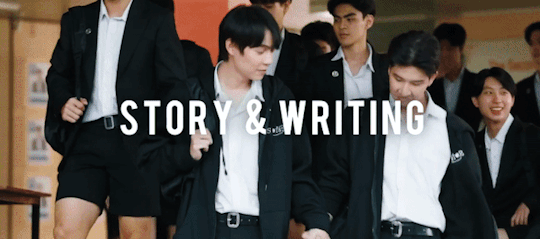
When it was first promoted, the show came across as a mystery thriller with possible supernatural/sci-fi influences as suggested by the title. But in fact this is a social commentary drama that scrutinises the education system and its hierarchy of power; the consequences of what this pressure does to both those enforcing it and the young people operating within it.
There is high tension from the get go, as several mysteries unravel over the course of the series. The pacing can be slow at times, but that is resourcefully spent on fleshing out a wide range of characters; exploring motivations, backstories, and their part to play in the wider story.
I saw a lot of speculation as to whether the climax was heading towards a unusual twist of sorts, but actually materialised into a tale much more ordinary. The use of 'the eclipse' is a metaphor rather that a situational event or happening as we may have been led to believe. As the story takes place within a school environment, it can fall within the conventions of that genre, but does it’s level best to provide refreshing new ground - creating higher stakes within a mundane setting.
There were some silly moments, one of which involved an accidental kiss in a shower stall that frankly denied all laws of physics, and an infamous ‘it was all a dream’ fake-out kiss (which was perfection had it been real), which I guarantee drew a universal ‘AWH WHAT?’ from viewers everywhere.
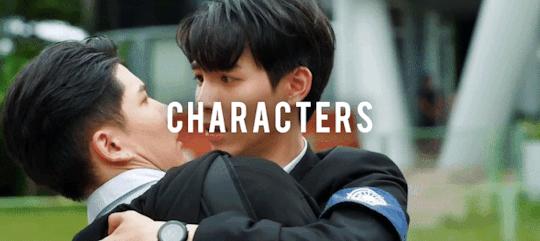
Characters: I give kudos whenever a drama deviates from the typical BL top/bottom tropes. Ayan is the confrontational rascal who is unafraid to display weakness, and possesses bags of emotional intelligence. He’s presented as a bad boy but is steadfastly righteous and incredibly supportive of others. What I really liked about Ayan is he can love Akk but still be critical and disapproving of his actions, encouraging him to change and do better. Too often do we see love as a justified means to gloss over wrongdoing or problematic behaviour. Akk is the studious, reserved but easily flustered and burdened prefect who disguises a host of inner turmoil. Both are incredibly likeable in their own right; Ayan with his smartass and cheeky demeanour, and Akk with his huge heart eyes and even larger dreams of bettering himself. Both are striving ‘to do the right thing’ but approach this in completely different ways. Unlike some BL pairings where the chemistry gets you hot and bothered, Akk and Ayan have a much more wholesome dynamic that feels like you're watching two people who are friends/confidantes first, lovers second. An example where emotional connection has higher importance over physical. It feels authentically real, and that’s no surprise because First and Khaotung just so happen to be long-term best friends. This is a slow burn, enemies to lovers romance that is especially entertaining during moments of push and pull.
Pairing Rating: [SENSITIVE + WHOLESOME] Expect an abundance of longing looks, playful sparring and mutually supportive, healthy relationship traits.
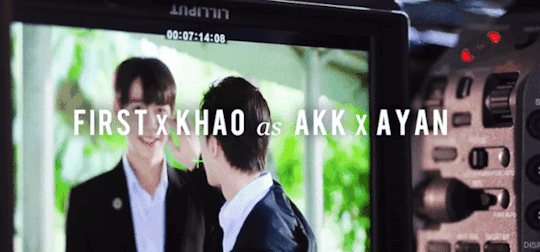
Acting Performance: The absolute highlight is First and Khaotung’s superb acting, in their first official stint as a couple and as main leads. I had already seen First’s work on ‘Not Me’ where his role was an instant personal favourite. This was my first time watching Khaotung and I am in awe. These two are incredibly talented at speaking volumes through looks alone - every glance and gaze is loaded with subtext or brimming with emotion. The amount of tension they can achieve through just staring is immense. They delivered some of the best crying scenes I’ve seen yet because they’re able to channel genuine feeling from their real life friendship. If you’ve seen their interviews, they’re known to often cry over how much they cherish each other. Clearly this is a winning formula. Another fun fact is that both First and Khaotung are tackling character types here they’ve never played before, which only emphasises their range.
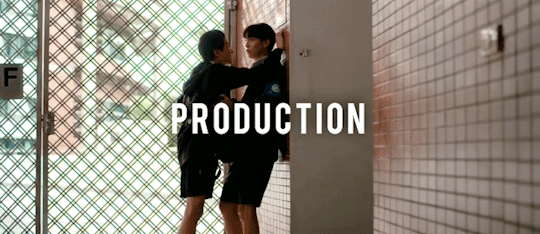
Production is fairly understated compared to others I've seen. They don’t do anything particularly creative or showy in the way they film or edit, but I think the objective here is substance over style.
Camera Work: A lot of shots are framed to look like they’re from the perspective of a bystander or witness. As a viewer, you can easily picture yourself in the shoes of another student lurking from afar or around a corner, who happens to stumble upon the scenes in front of you. This really hits home that this is a place riddled with secrets.
Music: The main theme ‘Over the Moon’ is very memorable, performed by none other than Khaotung himself. A piano version of this is often used as a backing track which is beautiful.
>>>
FINAL THOUGHTS: There is a strong emphasis on story beats here, where narrative takes precedence over romance. Pacing means the tension can sometimes wane or prolong, which leads to a bit of an abrupt crescendo at the show’s conclusion. First and Khaotung really do provide buckets of added value to this drama and without them, this would likely be a much less interesting watch.
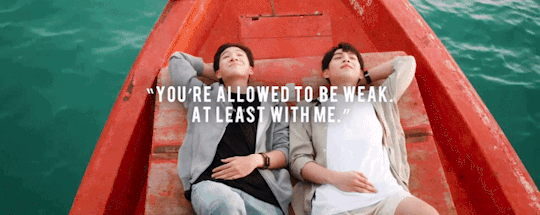
(Disclaimer: These are just my own opinions. It goes without saying that one still can enjoy a show for all its successes as well as recognising its shortcomings.)
#the eclipse#the eclipse series#akkayan#akkaye#akk x ayan#ayan x akk#firstkhao#khaofirst#first kanaphan#khaotung thanawat#bird-inacage reviews#the eclipse reviews#thai bl
43 notes
·
View notes
Text
The Gender Trinary: Hero, Maiden, Monster
I've talked about this before, but maybe it's worth doing so in a more comprehensive fashion.
----------
I should start by saying: this is not any kind of commentary on how the world really works.
It is an exploration of a symbolic paradigm that is meaningful to me, personally. (A paradigm that was, to be sure, more meaningful to me when I was younger and angstier and less-well-integrated into my life. But still meaningful.) It tells you far more about my own neuroses than it does about any external reality.
I have found it noteworthy, in fact, how poorly the gender trinary paradigm ends up mapping onto the reality of my experience. Feminism has made a hash of the Maiden role and its broader social salience, to no one’s surprise, but it’s the Hero role that really fails to sync up with the world around me. It’s rooted in a vision of normative masculinity that just...doesn’t line up with what men actually do, or how men actually feel about themselves, at least within my field of vision. Maybe that’s an artifact of my living in a rarefied nerd-bubble where no one really cares about the conventional masculine ideal. Maybe it’s an artifact of modern society being different from earlier stages of society. Maybe it was just an illusion to begin with, fostered by consuming too much genre media. I dunno.
In any event -- the point is that this concept-suite will probably break if you put any weight on it. If you find yourself inclined to poke around at it with questions, I’m probably happy to field them, but don’t be surprised if they end up being grounded in “I found these ideas powerful when I was an alienated bookish teenager, and the resonance of it has never really gone away, as the resonances of such things generally don’t.”
OK then. Moving on.
What is the basic idea of the gender trinary?
There are three “genders” -- hero, maiden, and monster. These correspond to the roles in a primordial, mythic passion-play narrative.
As it is written:
The Monster, who is transgressive, lays a claim on the Maiden, who is desirable and pure. The Hero contests this claim, defeats the Monster, and saves the Maiden.
Rama / Sita / Ravana is probably the best example of the pure, uncomplicated version of that story from “authentic” mythology. Many gender-trinary-tangent myths either have a monster who isn’t remotely personlike in any way (Perseus / Andromeda / Cetus) or complicate the interaction to the point of near-unrecognizability (Gilgamesh / Shamhat / Enkidu).
Modern culture has provided us with a lot of very pure, very recognizable gender trinary instantiations. Mario / Peach / Bowser and Link / Zelda / Ganon are absolutely textbook. Modern culture has also provided us with a lot of trope deconstructions (Braid, Dr. Horrible).
Versions of this story with a focus on the Monster form the core of the gothic-romance trope suite. Beauty and the Beast and The Phantom of the Opera are foundational texts.
Are those roles really “genders,” though?
Well, to some extent.
The trinary paradigm is definitely an overlay on the male/female gender binary, not a replacement for it. In particular, while the Hero role is undeniably masculine in its construction, and the Maiden role is similarly feminine -- even if you allow for female Heroes (which I do, absolutely) and male Maidens (which I do, kinda) -- the Monster role doesn’t really have its own parallel suite of gender tropes. A Monster can embody either extreme masculinity or extreme femininity, in ways that work within those concept-suites rather than subverting them. There are classic extremely-monster-y monsters who code as hyper-men (King Kong, Beast) and ones who code as hyper-women (vampy succubi etc.). Monsters can also certainly be androgynous, or display traits that are off-the-gender-spectrum entirely...but that tends to come across as ambiguously gendered or un-gendered rather than distinctively third-gendered. This is particularly relevant when discussing romantic and sexual attraction, which tends to be plugged into a very low-level set of physical and behavioral cues in a way that isn’t amenable to being warped through high-level narrative abstraction. Saying, e.g., that Adam is “bisexual” because he is attracted to both Lilith (Monster) and Eve (Maiden) feels pretty dumb.
But genders come with gender roles. And, to a large extent, the point of the trinary is to create (or make explicit) a set of three different gender roles that are all legible to each other, that all have their own distinct boundaries, and that all cohere internally. There are important ways in which a hulking manly brute monster and a slinky witchy siren monster and a totally inhuman bug monster all expect to play the same role in the broader context of society, and all expect to engage with Heroes and with Maidens in basically similar ways. Certainly, if you use social narrative as a guide, there are important ways in which all of those Monsters can expect to have similar standards of success and to be perceiving their own identities in similar ways. (Or so I posit.) And once you’ve gotten that far, well, “gender” doesn’t seem like an inappropriate term.
Your mileage may vary.
Aesthetics
This is basically a place for me to point out that there isn’t a single iconic image for any of these roles.
Heroes, in the full flower of their Heroic physicality, can run the gamut from lithe twinky bishounen to jacked Spartan hoplites with huge beards. “Wispy pink-and-purple fairy princess” and “voluptuously sensual earth goddess” are both overwhelmingly Maiden looks.
Monsters, as suggested earlier, get even more of a range than that. Their appearance can exaggeratedly emphasize physical power (ogres) or exaggeratedly de-emphasize it (Jabba the Hutt). They can possess extreme masculine beauty (Dracula), extreme masculine ugliness (Lord Voldemort), extreme feminine beauty (succubi), or extreme feminine ugliness (night hags). The only real commonality to a “Monster look” is that it should be somehow wrong. Ugliness is wrong by default; inhumanity is obviously wrong by default; beauty must be cast as somehow sickly or unwholesome. You can have Monsters who don’t look particularly wrong (Dr. Horrible), but this makes them “less monstrous” in the way that physical traits can make someone “less masculine” or “less feminine.”
Associated Concepts
Or: “What do these words mean, anyway?” The part for which you’re all here.
Perhaps it is easiest to start by saying: the “point” of the Monster role (in some sense) is that it is unsocialized and transgressive, and what it gets for those costs is self-expression and freedom.
Both the Hero and the Maiden are, essentially and necessarily, socialized roles. To be a [successful] Hero or Maiden, you must be embedded in some kind of society; you must be bound to the ideals of that society; and the success of your gender performance is, in the end, a reflection of how well you can embody those ideals.
(“Society” can mean a lot of different things here, and it doesn’t have to be particularly big or expansive or civilization-y. In particular, when you’re talking about Heroes, a little mutually-reinforcing “band of brothers” is very definitely enough of a society to qualify.)
The Hero role is obviously very related to the “male gender role,” although it’s not identical. At its absolute most basic core, it is about having the competence to fight in defense of your society and your Maiden. This radiates out to “competence,” in most senses of the term -- especially most pragmatic senses -- being a Hero power concept. Heroes do useful things for others. They fix the car, pay the bills, save lives on the operating table, etc.
(Domestic labor isn’t particularly Hero-coded, because [for mostly dumb reasons] it doesn’t have tight narrative associations with competence. Cooking and cleaning are not things that you do because you’re stepping up when others can’t. But domestic labor also isn’t particularly Maiden-coded in this schema. It’s not really anything-coded.)
Competition is also very close to the heart of the Hero role. Heroes compete with each other, with Monsters, and with the obstacles presented by the uncaring universe. I assume this is a direct outgrowth of the competence thing; you continually test, and continually show off, your power by pitting it against forces that will resist.
The Maiden role is, to be honest, the least-fleshed-out in abstract terms. (Probably because I was never in any particular danger of being seen as, or of seeing myself as, a Maiden.) It has a lot to do with love and sex, unsurprisingly -- in a standard Feminism 101 “Women are the Sex Class” kind of way, physical and emotional intimacy are part of the Maiden concept-sphere. It has a lot to do with emotional and social power, with the ability to change what people are thinking and feeling by interacting with them.
It has a lot to do with inherent legitimacy. Maidens in good standing are always valid. (Heroes must prove their validity, at least once, probably over and over; Monsters are always invalid.) This gets tied up with a certain, uh, avatar-of-the-society’s-ideals-ness.
One ramification of all this is that leadership is a Maiden thing. Most forms of political and institutional leadership, at least, and also probably household leadership as well. Maidens are the ones who contain the highest values of the society within themselves, and therefore the ones who are properly helming the ship of state, telling others what to do; they’re the ones who are good enough with people to wield command. Often they act through Hero subordinates or champions.
A Hero being in charge, in this schema, means that something is somehow off -- he’s probably dominated by his own ego and love of victory, rather than having the best interests of the society at heart.
(Exceptions apply for fully Heroic sub-institutions like the military. But those are “supposed” to be subject to some kind of higher Maiden-controlled authority.)
Both the Hero role and the Maiden role come with a strong baked-in requirement of desirability. Heroes and Maidens are supposed to be beautiful, outwardly and inwardly. Occupying either role means that you are obliged to be appealing to members of the other role in a romantic/sexual sense, and to be appealing to the society-at-large in terms of embodying its ideals and meeting its needs. Failing to appeal is...well, a failure.
Monsters are driven by their own internal, asocial urges. They act contrary to the ideals and the needs of their societies. They are freed from the requirement to be desirable by being automatically anathemized.
Needless to say, of course, it is possible for Monsters to appeal -- romantically/sexually (as in gothic romances) or even on a broader cultural level (if a Monster is faddishly fetishized, for example). This is never [in the theoretical conceptual perfect-spherical-gender sense] because the Monster has fit itself into a template of desirability; it is because some other party has perceived the Monster’s idiosyncratic self-constructed identity, hidden or overt, and found it lovable. It is [in theory] always sui generis and always the fruit of a unique, un-ritualized interaction.
“Doesn’t fit into society” covers a lot of conceptual ground -- a lot more ground than “does fit into society.” Monster-hood manifests in many very-divergent forms, because there are so many ways to be different and taboo.
Alienation is pretty central to the role concept. Normatively monster attitudes range from “grumpy and desirous of being left alone” to “omnicidally angry.”
The role-syntonic (positive) Monster ways of being in love involve pedestalization, possessiveness, and focused obsession. It is important to distinguish the loved one from everyone else.
The Monster role is neither particularly active nor particularly passive. “Has a scheme to remake all reality and will stop at nothing to achieve it” is a very Monster deal. So is “sits in a cave, contemplating its own strange thoughts, and will never interact with any part of the world unless disturbed.”
The archetypical Monster is an egomaniacal monad, but for narrative purposes it’s possible for a Monster instead to be a foreigner -- to be beholden to the ideals and structures of a society, so long as it’s an alien one.
Gender Interactions in the Trinary Paradigm
It’s worth remembering that the quintessential gender trinary story is a struggle. In a high conceptual sense, it’s a struggle in which all three roles are thrown together to find out which two of them will pair off.
(In theory, I’m sure, you could end up with a balanced triad. But I don’t think we have good stories about how that would work or what it would look like. The dyadic nature of human reproduction has a lot of concept influence.)
The most common pairing, of course, is Hero/Maiden. The Monster is defeated -- we assume that its influence was generally a bad one, even if somewhere along the way it might have had some appeal -- and the pro-social lovers unite, bonded by their shared ideal.
Maiden/Monster is an essentially psychological pairing in most cases, driven by deep interpersonal communication that supersedes social expectations.
Hero/Monster is the least common pairing. Which is no surprise, because (as mentioned) Maiden is the role that’s associated with love and sex; the Hero and the Monster are fighting over the Maiden, in theory, and something weird has to happen to change that. But there are a few well-established narratives here. The often-bromantic-rather-than-romantic Gilgamesh/Enkidu story is one. There’s also the version in which the Monster is made very feminine and the Hero shifts to the center of the love triangle. This gets you a sort of gender-reversal of the Maiden/Monster pairing; the Maiden ends up being portrayed as shallow or bland, and the Monster provides a truer / spicier / more genuinely personal sort of love.
110 notes
·
View notes
Note
Top 5 BLs (besides Vice Versa cause we know that’s your #1)? Top 5 movies of all time?
NOT THE BLATANT VICE VERSA CALL-OUT SKFJGDSKFGSDGFKJ but you know. fair enough ;;;;;; so here we go!!!!!
TOP 5 BLs (besides vice versa)
1. moonlight chicken. i feel like the show suffered a little from the two episodes per week release and all the disputes in the fandom, but by god do i personally adore this series and feel wildly protective of it. the story is packed with so many different topics – including disabilities, LGBTQ+ experiences, socioeconomic status, family, grief – that it would have been so easy to make a mess of it all, but somehow they were able to woven all these themes within the narrative in the most coherent and natural way possible. every single relationship is so deeply compelling to me and the deeply romantic atmosphere exuding from the show is almost intoxicating. very unpopular opinion but to me this is p’aof’s best work to date.
2. a tale of 1000 stars. this is a spectacular series, a fairytale-like story that delivers emotionally powerful messages about growth, community, second chances, and personal redemption. the pace does lag a little towards the end, but even the misunderstandings and the temporary separation between phupha and tian are actually functional to the story and ring true to their characters rather than feeling like an excuse to add some drama, which i always appreciate.
3. history 3: trapped. this is not a perfect show and im aware of it: the plot has many shortcomings, and i personally find that the narrative tone in taiwanese BLs sometimes clashes with the overall atmosphere of the story. the ending, too, may not be satisfactory for most people, but it feels authentic to me. i honestly adore this show with all my heart, and the relationship between tang yi and shao fei is one of the healthiest i've ever seen.
4. old fashion cupcake. beneath the seemingly casual premise and despite the short runtime, this show is an incredibly insightful story that examines societal norms about age and gender and that defies conventions. it’s the perfect fusion of witty humour, quirky romance, gentle drama, and tender emotions, reminding us that we’re never too old to love, to dream, to experience the world. i love love love it.
5. triage. as i mentioned before, this show isn’t for everyone, but it is for me specifically. it’s an extraordinary and exhilarating journey packed with action and suspense and clever twists, so much so that i can even overlook the ending being a little too chaotic. tol’s character development is honestly one of the best ever written, and even if the romance isn’t as strong as someone may wish, i twill always be one of my favorites.
TOP 5 MOVIES OF ALL TIME
MIND HAS GONE COMPLETELY BLANK ONCE AGAIN I’VE FORGOTTEN ALL THE MOVIES I’VE EVER WATCHED. it’s also hard to find the right balance between objectivity and personal preference in this case, so im just gonna put down the first few ones that come to my mind for different genres (in no particular order and with no explanation because if i actually stop and think about it im never gonna make up my mind)
in the mood for love.
vertigo.
the apartment.
alien.
fargo.
(not convinced about these at all but whatever. except for 'in the mood for love', that movie changed the trajectory of my life)
#do you know how painful it is for me that i can't put last twilight in my top 5 BLs..........#itsay would probably fit somewhere in there if i could ever rewatch it but alas it hits too close to home#also the more i look at those movie choices the more doubts i have but with every single title that comes to mind im like#BUT IS IT GOOD ENOUGH TO BE IN THE TOP 5 MOVIES OF ALL TIME#so yeah. im having an existential crisis#ANYWAY. thank you so much for asking anon!!!!!!#hope you're having a wonderful day!!!!! 💜#my top 5#m: ask
3 notes
·
View notes
Text
LWJ Cosplay Log
Layer 0: Hair, Props, and Cheating!
False Lapels (假领)
I caved and made cheater lapels, a purely modern invention so you don’t die in your layers. In winter, I will wear my full undergarments. In summer, I will tie this fake lapel around my neck to ventilate and streamline the dressing process. Everyone be wearing cheater lapels now! Who cares about authenticity when you look good and aren’t overheating.
youtube

Magic Weapons (法器)
As mentioned before, LWJ originally was a casual cosplay. Meaning I was just going to buy him and dress up but being the nitpicker I am, I was not 100% happy with the choices on Taobao (at the time). Hence, I made LWJ from scratch (what was I thinking, mistakes were made…). But I did buy Bichen to keep myself to task. Nothing makes you finish a cosplay like having a piece of it haunting you.
Made a foam guqin but was feeling burnout by then so didn’t put as much effort in recording the process. I mean, it’s printing scaled patterns, cutting them out, and then tracing the foam. Then it’s all glued together. Lots of glue keeping everything together. A lot like how I made Levi’s ODMG way back, so I’ll link that tutorial for anyone interested. Also, anyone can make a bag so nothing to say there. Tassels were dyed using the Koolaid method I used for the leathers.

Yugiri’s ODMG Tutorial: https://yugiri315.tumblr.com/post/647365286642712576/one-of-my-first-tutorials-i-made-odmg-so-i-could
Wig
Everyone in ancient China had long hair so gotta work it! Historically, adults put all their hair up in public. Any deviation from that would indicate anywhere from poor manners to foreign origin and was generally frowned upon. A man having his hair down and disheveled could even be judged a criminal on the run. Lan Wangji’s hairstyle would therefore be considered improper for a gentleman of his age and station. Sticking a guan on your half-topknot or slapping a ribbon on isn’t some quick fix that will make you instantly socially acceptable. You just look like a rich maybe-barbaric asshole.
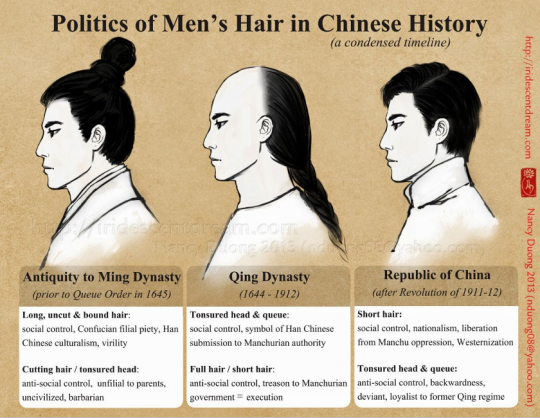
More Info on men’s hair here.
Then film was invented and eventually wuxia dramas, a genre that often explored and tested cultural conventions and featured characters from the fringes of society like orphans, outlaws, and women prominently. Between the nature of wuxia and modern sensibilities, somehow the anachronistic half up-do was invented and accepted as “historical.” This happens in Bollywood and Hollywood too, where some anachronistic elements cement themselves as historical fact in the popular zeitgeist. So now hip, young gentlemen from fantasy China have this nice half-do or ponytail. Having a guan or just a hairpin or ribbon indicated which side of middle-class you’re on and only old, stuffy characters put all their hair up (sometimes).
BUT, I would like to propose a caveat. Wangji is a cultivator. In fiction that means he’s a martial arts wizard knight but they are modelled after actual sages and alchemists trying to achieve immortality in the mountains and mystical Taoist priests that Chinese writers simply embellished. In older fictions, you will see cultivators are more historically grounded and their powers are relegated to the improbable but humanly possible spectrum compared to their modern renditions, where one can be born with golden cores or immortality can be achieved easily depending on the writer. In some cases, actual famed Taoist priests make an appearance with OPed supernatural powers like Qiu Chuji in Jin Yong’s Legend of Condor Heroes. A note about historical Taoist priests and sages is as they have exited mundane society to be more in tune with the natural world or are considered eccentrics, they are often portrayed with their hair down similar to the style of CQL Wangji or with some more disheveled and flexible hairdos. So it’s possible the cultivator hair style popularized in modern media today is based after some historical reality but poor historical research, lack of accurate sources, and just preference has misplaced it and now it’s part of pop culture and could not be more natural!
That explains the back of LWJ’s head but as for the front and still sporting forelocks into middle age…as my Chinese friends put it, LWJ is a 坏哥哥 that makes WWX all hot and bothered XDXDXD.
So yeah, how should LWJ style his hair is a surprisingly complicated question. Do you go by profession, socioeconomic standing, sexual appeal, fantasy worldbuilding creativity license, his inner bad boy rebellious side? The anime may have truly captured everything about his character on the top of his head!
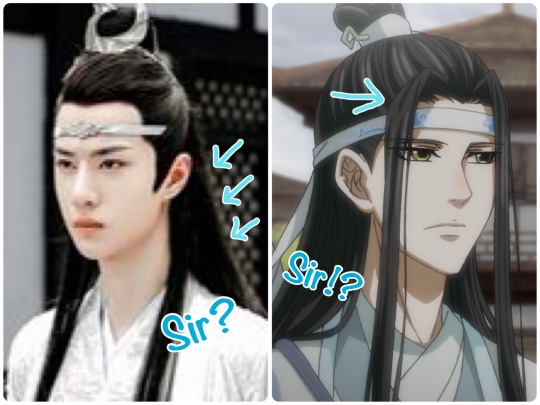
Our Hanguang-jun here may be a prim and proper killjoy but he is fashionable and sexy. Thus his beautiful, silky locks must be free!! (and what a pain it is to maintain and store him XD)
youtube
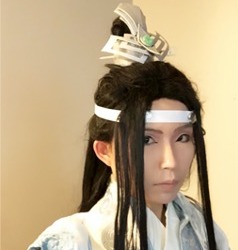
For synthetic wig fibers, I wetted it with a homemade detangling spray and heat when styling. Usually, I finish wig styling with a hardcore, glue-like spray like Got2B, especially with a complicated hairdo like this. But I’m contemplating this as a generic cosplay or hanfu wig so want to leave myself an opening to restyle it if I’m feeling ambitious. We will see.
DIY Wig Detangling Spray:
It’s basically 1:4 to 1:6 dilution of lotion/fabric softener/conditioner in water
https://www.deviantart.com/stealthos-aurion/art/Tut-HOMEMADE-WIG-DETANGLER-252023136
https://www.youtube.com/watch?v=StFHQ0mPdY0
https://www.youtube.com/watch?v=mcyqp2iqk0g&t=175s
#my cosplay#yugiricos#yugiri315#cosplaywip#cosplay wip#cosplay accessories#overthinking an anime#dansou cosplay#wigs#historical costuming#lwj#lan wangji#lan zhan#mdzs#mo dao zu shi#hanfu#漢服#魔道祖师#魔道祖師#蓝忘机#蓝湛#男装コスプレ#コスプレ
57 notes
·
View notes
Text
Carol & Daryl - Icons of the Apocalypse
Let’s start at the very beginning – do you know what “apocalypse” means?
Most people would probably say something like, “the end of the world” and that’s not wrong.
But it’s important to note that “apocalypse” doesn’t necessarily mean the end of everything. There’s got to be something left in a post-apocalyptic narrative – otherwise there’s no story to tell.
Let’s think about what apocalyptic narratives are all about.
According to Lois Parkinson Zamora (1989), apocalypse: “derives from the Greek apokálypsis, to uncover, reveal, disclose (the root is kalypto, to cover or conceal, and is familiar to us in the name of the nymph Calypso, who hides Odysseus for seven years)”. Apocalyptic stories are fundamentally concerned with uncovering or revealing and the best storylines in TWD stay true to this central theme: like how the apocalypse uncovered Carol’s strength and revealed Daryl’s softer side.
James Berger (1999) describes the apocalypse as a process that “burns and distils” – akin to a cleansing fire. This is interesting because Carol is repeatedly linked with a fire motif: she burned bodies in Season 4, she started a fire at Terminus, and burned Saviors alive in Seasons 6 and 9. And Carol references fire when she talks about her own journey from an abused housewife to a post-apocalyptic powerhouse:
“Who I was with him [Ed], she got burned away. And I was happy about that. I mean, not happy but . . . At the prison, I got to be who I always thought I should be, what I should’ve been. And then she got burned away. Everything now just consumes you.”
At this moment in time, every burning feels like another death. Every time Carol drops another facade (e.g., soccer mom, wolf, helpless woman in the slaughterhouse, queen, Commonwealth baker), she burns through another self. But the way I see it, each burning is like a cleansing fire and Carol’s getting closer to her real self each time. Every burning leads her closer to finally accepting her authentic self. Every burning brings her closer to achieving freedom and happiness with Daryl.
How does Daryl respond to Carol’s comments in Consumed?
He replies, “we ain’t ashes.”
Daryl’s response plays into another key component of apocalyptic convention as “the belief in a second chance underpins most apocalyptic thinking” (Maria Manuel Lisboa, 2011). Daryl doesn’t see Carol as depleted, or tainted, or beyond saving. There’s hope for her yet. And there’s hope for them to move forward together.
Hope is a word that comes up again and again with Caryl. They find hope in each other, and they inspire hope in viewers. And you know what? Apocalyptic narratives are all about hope. There are always some good people left and you see total strangers moved to kindness. The world may have altered beyond recognition, but it’s usually implied that there’s a better future ahead (it might just take a little while to get there).
Catherine Keller (2004) writes, “apocalypse transforms the object of fear into the site of hope”. And this is the thing that strikes me about Caryl – in a way, the apocalypse was the best thing that could have happened to them. The apocalypse allowed them to break free of their shackles, the apocalypse gave them a found family, the apocalypse made them become better versions of themselves. Most importantly of all, the apocalypse brought these two soulmates together. And Caryl have found hope, love, and comfort in one another from the first Cherokee Rose.
Carol and Daryl are icons of the apocalypse. They embody so much of what the genre is all about and that’s one of the things that makes their dynamic so compelling.
Caryl on!
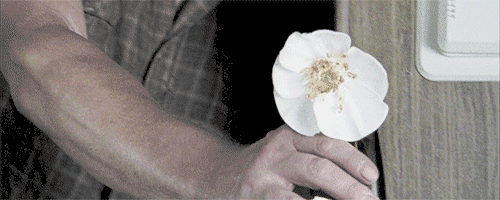
19 notes
·
View notes
Note
Ok, honest question, and please don’t call me homophobic, but why are 90% of the shippers SO invested in seeing Dean/Jensen hooked up with another man, are in fact hetero or gay women? Never realized so many women were turned on by gay men. Especially, gay women. Is this a thing?
This is a great question and I love these discussions.
Sometimes the "women" in question are exploring their gender identities and come to realize that they aren't cis. However, it's super common for cis women to enjoy real or imaged queer male romance and sexual relationship.
It's existed in fandom as long as fandom has been around. Before the internet, women were exchanging print media about Spock/Kirk. It's also cross cultural. For example, Yaoi/Boy's Love is a genre of media about men in same-sex relationships.
In an interview with a famous scifi writer, Mariko Ohara says,
As for me, I started writing yaoi, not as an imitation of others, but as a narrative (in those days, we called this kind of fiction simply the homosexual novel) necessary for the description of sexual love in my imagination. Probably I was not able to enjoy the conventional pornography, which had been made for men; I feel impatient with its patriarchal form. This is why I could not help but produce a new style of sexual love. And I was not the only one who thought this way. It is the female imperative that produced yaoi fiction in Japan and other countries simultaneously.
She wrote Kirk/Spock as a way to explore herself and the world around her.
There are some queer men who see this fascination as no different than straight men who enjoy lesbian porn. Just as most lesbian porn is made by men for men and is rarely seen as authentic by actual lesbians, so it is for a lot of content produced about queer men in fandom.
This article talks about how a woman admitted to enjoying gay porn on tiktok and was harassed for it. The article notes that women represent more than 1/3 of the views on Pornhub's gay male videos.
Lots of different theories have emerged as to why this exists. The article notes
[T]he majority of heterosexual porn is created by men, for men, and is therefore not reflective of female desire. In turn, these women resort to watching porn created for a demographic that’s been similarly marginalized, since gay men, too, have historically had their desires ignored and their representation in erotic texts co-opted.
...Dr. Lucy Neville has interviewed more than 500 women over five years on this very subject. In her research for the book, Girls Who Like Boys Who Like Boys: Women and Gay Male Pornography and Erotica, Neville found that, similar to what Layla, Kirah and other likeminded women shared with me, women’s reasoning for liking gay porn was more about what they didn’t like about straight porn than what they enjoyed about gay male porn.
Since fandom is often composed of women, especially queer women, women feel more free to share their sexual desires.
What's more, often people kink on what they fear. Tumblr's fandometrics showed that fandom leans left. If you look at A/B/O, which was created in the Supernatural fandom, it's basically kinking on the patriarchy. By using male characters and subjecting men to extreme patriarchy, it can be easier to enjoy the story as a fantasy.
Wish I could dive into this topic more, but it's huge to the point where multiple books have been written on the subject and there's lots of essays and studies examining the subject.
4 notes
·
View notes
Text
Side A: Will

What does music mean to you? How does it make you feel?
Music's such a big part of my life. It sounds weird, I kind of set myself milestones in my life to do with music. If I've ever got university assignments coming up or anything, I'll be like, "Once you've got this out of the way, you've got a gig coming up." It's how I kind of set myself goals - I know I've got a sick gig coming up. Music is just such a big part of it. I've played instruments in the past. I've played drums in the past and I'm always listening to it and yeah, I love it. My whole family is really into music as well. And it almost just feels like part of my DNA at this point, to be honest.
How big of a part does music play in your life and career?
It is just a big part of my life, but career - I've always thought about maybe doing something related to music, cause I'm a marketing student, so I've always thought it would be cool to do some kind of marketing, for like a music firm or something. Working in music would be nice, it's just so hard to reach that stage. But if I'm dreaming maybe I can get into music at some point or work in the music field. That would be pretty cool.
What's a song you know word for word, bar for bar?
I'm gonna have to probably say - when I was like 14, 15 years old, I used to listen to so much Logic back in the day, I can't say I listen to him much now, but I used to love Logic - I think it's, there's two songs by him I mainly know. It's either Fade Away off of The Incredible True Story or his song All I Do, which was I think only just added to Spotify recently, but that's a really good song. And I'd say still check that song out. That's a good song.

Do you collect vinyl? If so what do you enjoy about it? And if not, how come?
I collect a lot of vinyl. I think I've been collecting since I was 15 years old. So I think the first vinyl I ever got was actually from my parents. That's how I got into vinyl collecting. And I think it was the Coldplay album with - I dunno what album it was, but it had a music video of a bunch of monkeys dancing - I know it was that album, whatever that was. So I got that, that was my first ever vinyl. I think the next one was also from my parents and it was, Ed Sheeran - Divide as well, I think. But since then, over the last five years, I've kind of been building up my collection into genres I like a bit more, so I've been buying a lot of Hip Hop, a lot of R&B records. And I think my records [are] over like 70, 80 vinyls at this point. I love collecting vinyls and I think the reason why I do it as well is just it's I feel like vinyls are almost an experience. Anyone can just get their phone, slap on Spotify or Apple Music and just play music, but vinyls give you that authentic feel. I don't even know if it's the sound as such, it's just the whole process of getting the vinyl, flipping over to the B side. It's just a really cool experience and yeah, I'd recommend everyone get into vinyl collecting, to be honest.
Tell me about your favourite concert that you went to.
This is probably the hardest question yet. I haven't been to loads, but I've gone to a lot of my favorite artists now. So I've seen Slowthai a few times. I've seen Loyle Carner a few times, Cavetown, Rex Orange County a few times, but I think gig that really, really blew me away was seeing Childish Gambino, at The O2 in London, it's just unbeatable. I idolize Donald Glover so much and to see him live - admittedly I wasn't the standing, I was sat down, but even still, that gig was that gig was incredible. He's such an icon. And I would do anything to watch that again.
Your favourite lyric?
This isn't gonna be the conventional answer for "favorite lyric." I'm really weird, how my brain processes lyrics and music. I don't remember lyrics. Other than, like I said, a few songs if I listen to [it] a hundred times, but I know some people listen to songs like three times and pick up on it instantly, my mind just doesn't work like that. And I think it's 'cause I was a drummer in the past, whenever I listen to music, I always listen to the beat of the music. So I always hear the drums, maybe the snares, the bass drum or the toms and stuff. My mind just subconsciously automatically goes to the drums itself. I just don't really pick up lyrics. I honestly just, can't say I have one off the top of my head to choose from.
Give me the name of a playlist you made with no context.
hotboysummer

What are your desert island disc albums?
So if I had to pick three albums, I'm trying to think the first would Not Waving But Drowning by Loyle Carner. Second would probably be Because the Internet by Childish Gambino. And I reckon the third would be - I listen to a lot of indie, bedroom pop. So probably Sleepyhead by Cavetown for the third one.
Tell me about music your parents played while you were growing up.
So both my parents, they used to love the movie Amelie which is a French film that I'd highly recommend. My mum in her car, I remember she always used to play the CD of the Amelie soundtrack. I'd probably say that was kind of what I'm used to. My dad used to play a lot of James Blunt back in the day, so maybe one of the older James Blunt albums as well.
Briefly talk me through the songs you put in this playlist, what do they mean to you.
When I was compiling the playlist and the songs, I kind of wanted a bit of everything. I listen to a lot of bedroom pop and stuff, that's the kind of music I listen to when I want to chill. Then I have bunch of rap on there. I kind of just picked stuff that was from when I was growing up, like the main artists I used to listen to. I used to listen to so much EDEN in the past. More recently in the last year, since the Pony era, I've been listening to Rex a lot more. Loyle Carner - I'm a huge, huge fan of who I've seen at Glastonbury a few times. I just picked out a bunch of artists that just mean a lot to me personally. So I've met Loyle Carner in person before. He was absolutely amazing, he's such a nice guy. I met Rex the other week at his London popup show. Then I guess the one other that wasn't like normal music was One Summer's Day which is, I can't remember the composer - Joe Hisaishi, I think, for Spirited Away, but Spirted Away was such a big part of my childhood, so that album, all the music, just means a lot to me. It tears me up whenever I listen to it, 'cause I love that movie so much. But yeah, like I said, I just picked a bunch of songs that I loved, from artists I've loved throughout the years. That's the gist of it.
Watch Will's interview below on TikTok.
#portrait#playlist#music#interview#rap#bedroom pop#loyle carner#photography#lyrics#portrait photography#35mm
4 notes
·
View notes
Text
Find Your Voice: Crafting a Unique Writing Style for Your Book
Find Your Voice: Crafting a Unique Writing Style for Your Book
Your writing style is your fingerprint on the page. It's the distinctive way you weave words together, the rhythm of your sentences, the imagery you evoke, and the tone that infuses your work. A strong writing style breathes life into your narrative, draws readers in, and sets you apart from the crowd.
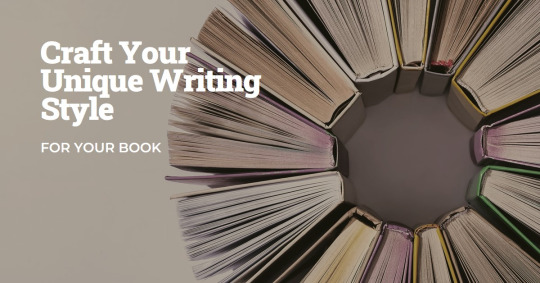
But how do you discover your unique writing style, and more importantly, how do you hone it for maximum impact? Let's dive in!
Why Writing Style Matters
Authenticity: Your writing style reflects your personality, experiences, and worldview. It's what makes your work genuinely yours.
Reader Connection: Readers crave voices that resonate with them. A well-defined style builds an emotional connection and fosters a loyal readership.
Memorability: A distinctive style helps your book stand out in a saturated market, making a lasting impression on readers.
Genre Fit: Different genres often have stylistic expectations. Aligning your style with your chosen genre helps readers know what to anticipate and enhances their enjoyment.
Elements that Shape Writing Style
Word Choice (Diction): Do you favor formal language, vivid descriptions, or snappy dialogue? Your word choices reveal your writing personality.
Sentence Structure: Varied sentence lengths and patterns create a particular rhythm and flow to your prose.
Imagery and Sensory Details: Engaging readers' senses through sight, sound, smell, taste, and touch makes your writing more immersive.
Tone: The overall feel of your work – humorous, contemplative, suspenseful, etc. – sets the mood for the reader's experience.
Point of View: First-person, second-person, or third-person narration significantly influences the way readers connect with the story.
Tips for Improving Your Writing Style
Check out the following Incredible Tips for Improving Your Writing Style
Read Widely: Pay attention to authors you admire. Analyze how they construct sentences, use language, and establish tone.
Experiment: Don't be afraid to try different techniques. Write a scene in a humorous tone, then rewrite it in a somber one. Notice the impact.
Freewrite: Let loose without worrying about grammar or perfection. This helps you find your natural voice and uncover hidden tendencies.
Embrace Your Quirks: What makes your writing different? Lean into that uniqueness instead of trying to mimic others.
Find Your Rhythm: Read your work aloud to assess how it flows. Is it smooth and engaging or choppy and awkward?
Get Feedback: Share your writing with trusted readers or a critique group. Seek specific feedback on your style's strengths and areas for development.
Revise with Purpose: Don't just edit for errors. Consciously make stylistic choices to strengthen your voice and enhance the reading experience.
Finding the Right Style for Your Book
Consider these factors to Pick the Perfect Writing Style For Your Book
Target Audience: Who are you writing for? Their age, interests, and reading habits should guide your stylistic choices.
Genre: Research style conventions within your genre. Understand reader expectations while still leaving room for your individual flair.
Theme and Tone: A serious exploration of grief might call for a different style than a lighthearted adventure story.
Caution: Avoid These Style Pitfalls
Clichés: Overused phrases lose their impact and make your writing sound generic.
Imitation: While inspiration is great, directly copying another author's style will do you a disservice.
Inconsistency: Jarring shifts in tone or diction can confuse and disengage readers.
The Joy of Discovery
Developing your writing style is an ongoing journey of discovery and refinement. Celebrate the process! By being intentional, reading widely, seeking feedback, and continually experimenting, you'll cultivate a voice that is unmistakably yours, attracting the ideal readers ready to resonate with your unique way of storytelling.
0 notes
Text
10 Reasons Readers Might Abandon Your Book

Reasons Readers Quit Reading Your Book
As an author, pouring your heart and soul into a book only to have readers abandon it mid-way is a disheartening experience. While every reader has unique preferences, certain pitfalls can cause even the most avid bookworms to lose interest. Understanding these common reasons, readers quit reading can help you improve your writing and keep them turning those pages.
1. Slow Start and Lack of Engagement
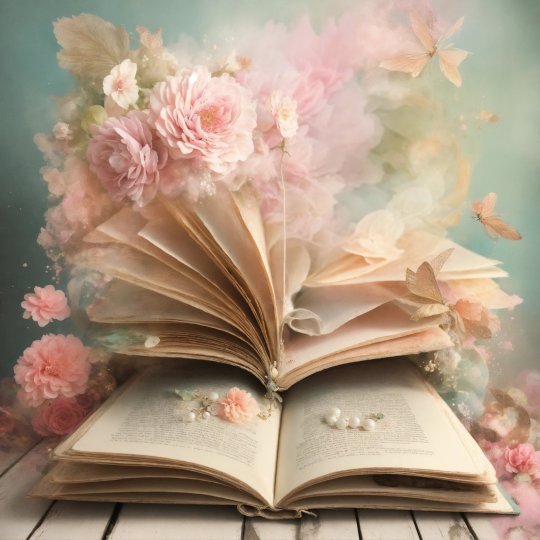
The first few chapters are crucial. If the beginning drags, lacks action, or fails to establish a compelling conflict, readers may lose interest before the story truly unfolds. Ensure the opening scene grabs attention, introduces the main character's desires or struggles, and sets the stage for the central conflict.
2. Unlikable or Unrelatable Characters
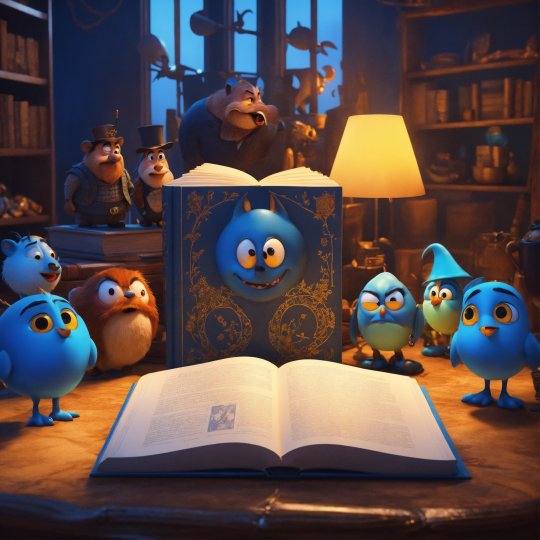
Readers connect with characters who feel real, flawed, and relatable. A protagonist who constantly whines makes illogical decisions, or lacks any redeeming qualities will quickly alienate readers. Invest time in developing well-rounded characters with motivations, desires, and flaws that readers can empathise with or root for.
3. Predictable Plot and Lack of Suspense

A predictable plot with no twists and turns can leave readers feeling bored and unchallenged. While some genres lean towards formulaic structures, even within those frameworks, creating suspense and leaving readers guessing about what unfolds next is crucial. Introduce plot twists, foreshadowing, and cliffhangers to keep readers engaged and eager to discover what happens next.
4. Clichéd Dialogue and Unrealistic Conversations

Forced, unnatural dialogue filled with clichés can take readers out of the story. Listen to how people talk in real life and use it as a guide. Consider the characters' backgrounds, personalities, and situations when crafting their dialogue, ensuring it sounds authentic and reflects their individual voices.
5. Excessive info dumping

Bombarding readers with excessive backstory, world-building details, or historical information can bog down the narrative. Weave essential information into the story organically, revealing it through dialogue, action, or character introspection. Aim for a balance between exposition and the advancement of the plot.
6. Technical Errors and Grammatical Mistakes
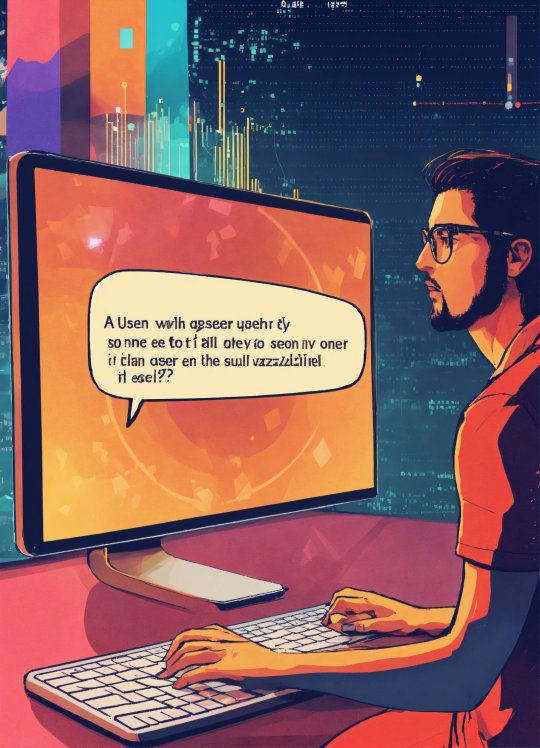
Typos, grammatical errors, and inconsistencies can disrupt the reading experience and pull readers out of the story. While the occasional error is understandable, consistent mistakes can leave a negative impression on your writing and professionalism. Utilize editing tools, proofread your work meticulously, and consider involving beta readers or professional editors to catch any remaining errors.
7. Inconsistent Pacing and Uneven Storytelling
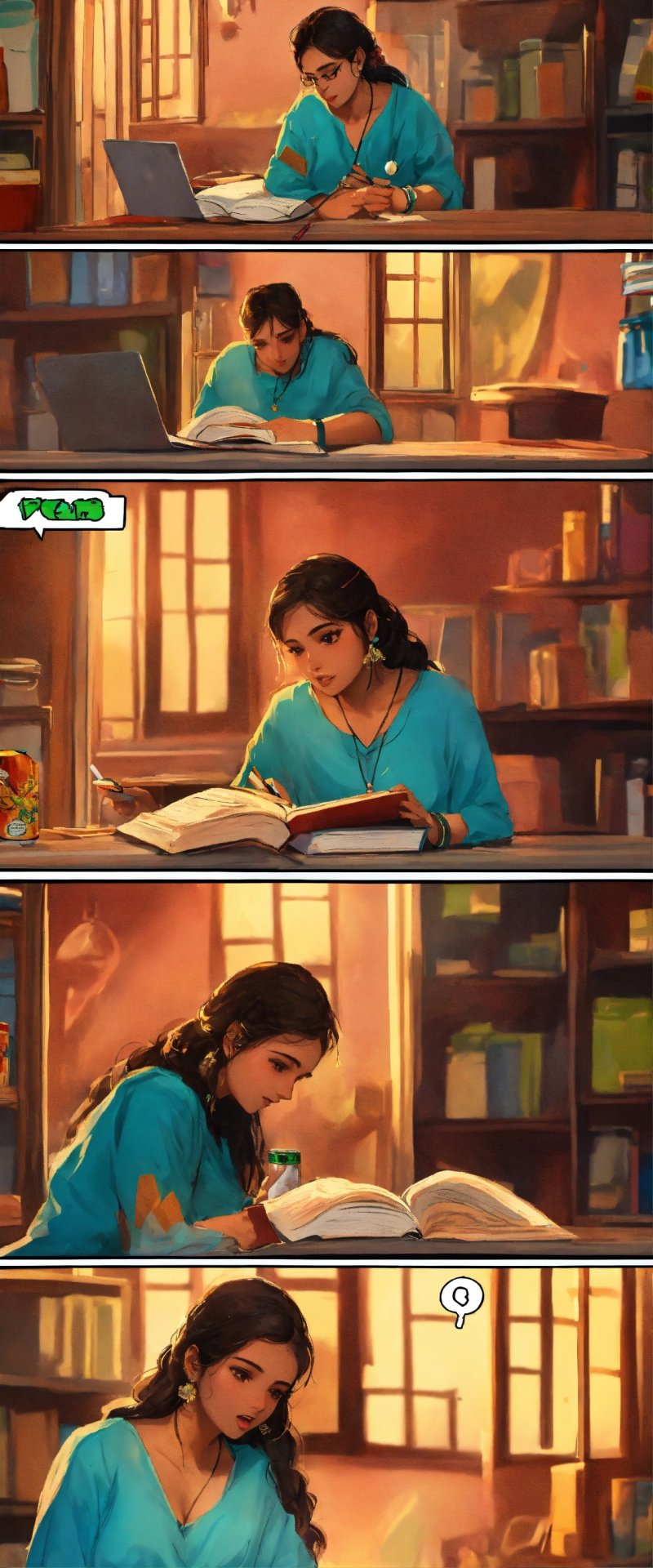
A story with inconsistent pacing can feel jarring and leave readers confused. Avoid long stretches of slow exposition followed by rushed action sequences. Aim for a natural flow, balancing moments of reflection with action and plot progression.
8. Unclear Point of View and Narrative Voice
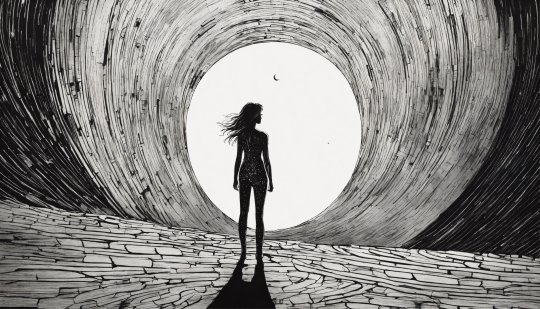
Readers need a clear understanding of whose perspective the story is being told from and the narrator's voice. Stick to a consistent point of view, whether first, second, or third person, and ensure the narrative voice is distinct and engaging.
9. Unrealistic Settings and World-Building

While fantasy and science fiction allow for creative liberties, even fictional worlds need internal consistency and logic. If the world-building feels illogical or lacks clear rules, readers may struggle to suspend disbelief and become invested in the story.
10. Genre Mismatch and Unmet Expectations

Ensure your book accurately reflects the chosen genre's conventions and expectations. If your sci-fi novel lacks any technological elements or your cozy mystery takes a dark and violent turn, readers who picked it up expecting a specific experience might be disappointed.
Remember, writing is a journey, and receiving feedback, even critical feedback, can help you grow as a writer.
While it's impossible to please every reader, by understanding these common reasons for abandonment and actively improving your craft, you can increase the chances of keeping your readers captivated and turning the final page with a sense of satisfaction.
Create your dream book now www.bookalooza.com/newbook
0 notes
Text
Exploring the Theme of Liberation and Desire in Gay Erotic Literature
Have you ever delved into the world of gay erotic literature and wondered about the profound themes of liberation and desire woven into its pages? This article will help you understand the impact of liberation and desires, the two most common themes in gay erotic fiction.

Liberation Narratives in Gay Erotic Literature:
In gay erotic literature, liberation narratives form the backbone of countless stories. These narratives go beyond the physical and delve into the emotional and psychological liberation that characters experience. It's not just about the liberation of desire but also the liberation of identity and acceptance.
Authors skillfully craft tales where characters break free from societal constraints, embracing their true selves and finding liberation in the arms of passion.
Navigating Desire and Freedom in Queer Literary Expression:
Queer literary expression is all about balancing desire and freedom. The words on these pages deal with the complex landscape of human connection, exploring the depths of desire while advocating for the freedom to love openly and authentically.
Through the artful use of language, authors in this genre empower their characters to embark on journeys of self-discovery, embracing desire as a natural and liberating force that transcends societal norms.
A Critical Exploration of Liberation in Gay Erotica:
Authors tend to challenge norms with their exceptional erotic narratives. These stories serve as a mirror and reflect the struggles of the LGBTQ+ community, offering readers a chance to empathize and understand.
LGBTQ+ community can resonate with the readers on a profound level and find comfort in knowing they are accepted in society. Gay erotic fiction invites the readers to question societal expectations and celebrate the diverse ways in which love and desires can be manifested. The critical exploration of liberation in gay erotica invites readers to question societal expectations and celebrate the diverse ways in which love and desire manifest.
Examining the Intersection of Freedom and Sensuality in Gay Literature:
It's not just about the act of liberation; it's about the celebration of sensuality as an integral aspect of human experience. These stories beautifully depict the intricate dance between freedom and desire, encouraging readers to embrace the multifaceted nature of love.
The intersection becomes a safe space where characters not only find freedom but also immerse in the richness of their desires, transcending the boundaries imposed by society. The exploration of liberation and desire in gay erotic literature is a journey that invites readers to question, feel, and celebrate the diverse expressions of love.
'Construction Bang' by Thaddeus Chadwick Luther is one of the intoxicating and euphoric reads! This throbbing novel invites the readers on a passionate journey where forbidden desires are fulfilled within the backdrop of a place where sparks fly both on and off the job site. This gay erotic fiction delves into the intense and provocative topic of men being forced into homosexuality. With its raw and explicit content, including forced gay sex and dirty dialogue, readers will be immersed in a world of taboo desires and forbidden encounters.
The author, Thaddeus Chadwick Luther, will take you into a world where sexual desires and longing challenge societal norms and redefine conventional expectations. Set against the backdrop of the bustling construction industry, the story follows the journey of a man whose life takes an unexpected twist when his sexual desires are fulfilled in the most improbable of locales.
When confronted with an unforeseen career change, the protagonist's life undergoes a remarkable transformation. Amidst the twists and turns of his professional journey, he stumbles upon an opportunity that offers more than just professional growth. As the tantalizing sexual desires of same-sex unfold, readers are beckoned into a realm where passion blazes, and the lines between desire and reality blur.
Thaddeus Chadwick Luther's 'Construction Bang' offers a daring and invigorating perspective on the gay erotic genre, challenging stereotypes and celebrating the beauty of diverse relationships. Indulge yourself in the heat of the gay erotica that will surely leave you throbbing hard! Head to Amazon and get your copy today.
0 notes
Text
Week 4: Reality TV case study
Reality Bites: Love It or Hate It, We Can't Stop Talking About It
Raise your hand if you've ever scoffed at reality TV, claiming it's trash TV, mindless drivel, a low point in human civilization. Now, keep it raised if you still secretly tune in, eyes glued to the screen as drama unfolds, cringing at cringe-worthy moments, and maybe, just maybe, shedding a tear for the heartbroken contestant. Awkward silence...followed by a sea of hands frantically rising.
Yeah, we have a paradox on our hands. Surveys may scream "No way, José!" to reality TV, but the Nielsen gods tell a different story. It sits there, the queen bee of TV genres, ruling the ratings even while we pretend it's beneath us. And guess what? This love-hate game has taken a fascinating turn – thanks to the wild world of digital communities.
From Passive Viewing to Digital publics
Remember when reality TV was confined to the TV box, a one-way street where producers poured manufactured drama onto our screens and we, the passive viewers, simply absorbed it? Not anymore. Social media has unleashed a digital community, churning out memes, gifs, and hot takes faster than you can say "blindside eviction." Twitter explodes with live commentary, Instagram stories dissect every wardrobe choice, and TikTok dances erupt around iconic catchphrases. Suddenly, we're not just watching, we're participating, creating, and yes, even judging.
Public Spheres Beyond Manufactured Drama
But this hyper-connectivity comes with a hefty side of responsibility. Digital communities have the power to hold shows accountable, exposing exploitative practices and highlighting the emotional labor contestants endure. Imagine the outcry if a meme goes viral, showcasing how producers manipulated a situation? The court of public opinion on social media can be swift and unforgiving.
And let's not forget the public sphere aspect. Reality TV, once dismissed as mindless entertainment, now sparks meaningful conversations about relationships, social issues, and even mental health. The online buzz becomes a platform for diverse voices to be heard, challenging stereotypes and fostering new perspectives. Suddenly, the "trash TV" label feels awfully flimsy.
Reality TV: A Paradoxical Powerhouse
So, the next time you find yourself glued to the screen, judging someone's fake tan or cheering on the underdog, remember – you're not alone. You're part of a complex, contradictory, and surprisingly impactful digital community. We may judge, we may cringe, but we also laugh, cry, and engage. And through that engagement, we have the power to shape the future of reality TV, pushing it beyond fabricated drama towards something more authentic, more reflective, and maybe, just maybe, more real.
So, let the love-hate battle rage on, fueled by memes, hashtags, and passionate rants. After all, in the age of digital communities, reality TV isn't just about watching – it's about talking, creating, and ultimately, shaping the narrative. And that, my friends, is something worth buzzing about.
Beyond the Screen: The Rise of Digital Reality
It's worth noting that reality TV's reach extends far beyond the traditional television screen. Social media has played a crucial role in diversifying the market and audience participation. The more reality TV appears on platforms like Twitter and Instagram, the more engagement it generates, attracting new viewers and offering existing fans more ways to connect with the shows and their stars.
Podcasts, recaps, conventions, and cameos are just a few examples of how social media has created a thriving ecosystem around reality TV. This digital sphere fosters interaction between fans and stars, further blurring the lines between the on-screen world and the real world.
The Paradox of Performance: Authenticity or Amplification?
One of the most intriguing paradoxes of this digital age is the pressure on reality stars to perform amplified versions of their private lives. As Jacquelyn Arcy points out in her study "The digital money shot: Twitter wars, The Real Housewives, and transmedia storytelling," reality stars' primary job is to generate engaging content for social media, often competing with their co-stars for attention, status, and even salary.
This focus on online performance raises questions about authenticity. Should we trust what we see on TV or social media? Are these carefully curated personas, or glimpses into the real lives of everyday people? This blurring of reality and performance is one of the defining characteristics of contemporary reality TV, and it's something that viewers and scholars alike are still grappling with.
REFERENCE:
Arcy, J. (2018). The digital money shot: Twitter wars, The Real Housewives, and transmedia storytelling. Celebrity Studies, 9(4), 487–502. https://doi.org/10.1080/19392397.2018.1508951
Cambridge Dictionary. (2020, January 29). reality TV | definition in the Cambridge English Dictionary. Cambridge.org. https://dictionary.cambridge.org/us/dictionary/english/reality-tv
Deller, R. A. (2019). Reality Television in an Age of Social Media. https://doi.org/10.1108/978-1-83909-021-920191007
0 notes
Note
Why was this media particularly meaningful to ‘younger you’?
The two films I selected share a common plot theme - young characters face adversity and ultimately achieve success or fulfillment in their own unique ways. The plotlines in these films deviate from conventional happy endings, as neither character attains what the audience initially expected. These realistic stories resonated with me as a young person who was experiencing adversity in her own life. I also favored media depicting teenage protagonists experiencing their lives real-world settings, rather than fantasy or sci-fi genres. I appreciated stories and settings that directly related to my own life experiences, such as Centre Stage. Watching these stories unfold on screen felt like watching my own life, and I frequently rewatched these movies, possibly using them as a way to better understand my own life.

youtube
"Spider-Man" was the first feature-length film I ever watched. I was first introduced through the 1967 animated Spider-Man television series by my father. The live-action film became one of my favorites, leading to a Blu-Ray purchase! I cherished this film from childhood through to my adulthood, deeply connecting with the character and the story.Spider-Man undergoes various challenges and life lessons in the film, including grappling with his dual identity, grief, relationship issues, bullying, and the transition from high school to university. I can relate to these struggles, having experienced similar issues during my tween to teen years to varying degrees.
In my childhood, I yearned for superpowers like Spider-Man, expecting to acquire my powers eventually. However, I began experiencing early signs of an anxiety disorder instead. To cope, my father suggested viewing my anxiety as "spidey-sense," providing yet another comforting link to my favorite superhero film (while also seeking professional help).
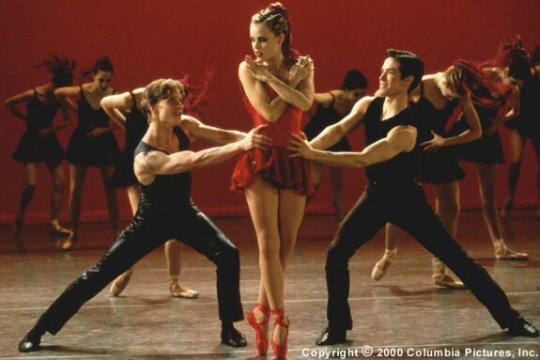
youtube
"Centre Stage" holds a special place in my heart and was a significant piece of media for my tween self. This film delves into themes like rejection in ballet, navigating relationships, eating disorders, and the struggles faced by dedicated artists. Its portrayal of ballet feels exceptionally authentic compared to many other dance-focused movies. Unlike many dance films that often follow a predictable plot of a ballet dancer longing to break free from ballet, "Centre Stage" stands out because its main character, Jodi, actually aspires for a career in classical ballet and heartbreakingly realizes she needs to transition away from it at the end of the film. Her journey involves struggling with her technical abilities and confidence, a storyline that resonates with me as a dancer who had her own insecurities. Unlike other ballet-focused movies such Darren Aronofsky’s Black Swan or Netflix’s Pretty Little Things, "Centre Stage" focuses on ballet without the need for extreme drama or psychological thrills, making it suitable for teenagers.
This film served as a precursor to my eventual decision to step away from my own aspirations of a professional ballet career. In the final scene, Jodi is shown confronting the School of American Ballet's program director, bravely asking him to not tell her if she was accepted into the company or not, realizing that her unique talents wouldn't be fully recognized in a classical ballet setting. She reclaims her agency by choosing a smaller contemporary dance company where she can thrive as a top-ranking dancer. This powerful moment resonated with me, helping me appreciate my own unique strengths as a dancer and come to terms with my shift away from pursuing ballet professionally.
youtube
Ryan Higa was one of the first YouTubers I ever watched. Following the linear-television-to-online-videos pipeline (Steemers, 2021), I became less interested in my usual TV programs and borderline obsessed with YouTube videos around the years 2007 and on. As a teenager, I found traditional TV less engaging and was drawn to the relatable content created by young YouTubers like Higa, who was about 17 at the time he first started posting videos. Unlike typical television content made by adults portraying their childhood and adolescence fantasies, Higa's videos were refreshing and relatable for young viewers like me (Steemers, 2021). His fast-paced, absurd, and occasionally inappropriate parodies provided a level of humor and relatability that traditional TV lacked. Higa's content became a significant part of my conversations with friends, leaving us with memorable quotes and catchphrases like "Sham-woo-hoo!"
0 notes
Text
making women complex characters
- Develop multidimensional, complex female characters with rich inner lives and diverse experiences rather than focusing solely on their appearance, relationships to men, or traditional gender roles.
- Avoid sexualizing or objectifying female characters for no purpose other than male gratification. Keep descriptions focused on plot and character rather than physical details.
- Give female characters agency, their own goals and motivations, and allow them to drive their own stories rather than purely reacting to male characters.
- Represent a diversity of women, including those of different races, classes, abilities, etc. Don't just focus on a narrow type.
- Be conscious of portraying women in traditionally masculine roles or professions in a realistic way rather than exaggerating challenges purely for drama.
- Don't use misogynistic language or perpetuate harmful gender stereotypes through your writing even if depicting problematic past settings or characters.
- Get feedback from female readers/editors to ensure your portrayal of women feels authentic and avoids unintended bias or offense. Be open to critique.
- Develop your understanding of feminist issues and women representation by reading works by female authors across genres and time periods.
- Respect and value all your characters as human beings rather than as props to serve a male-centered story. Approach writing female characters with the same care as male ones.
- Avoid sexual violence or using harm against women as a plot device or character development tool when unnecessary.
- Don't reduce female characters only to their relationships/roles in relation to male characters (wife, girlfriend, mother etc.). Give them their own social networks and support systems.
- Recognize how biases shape all storytelling and be thoughtful about counteracting implicit biases in both language and story structure that minimize women's experiences.
- Research accurate historical contexts if writing period fiction to avoid unintentionally promoting harmful past stereotypes. Think critically about the intent behind including certain attitudes or behaviors.
- Consider your male gaze - are you writing/describing things primarily from a heterosexual male perspective? Try writing scenes both objectively and from diverse character viewpoints.
- Don't invoke misogynistic tropes like the "crazy ex-girlfriend" etc. Be aware of harmful stereotypes about women and challenge them through multi-dimensional depictions.
- Give female characters space to show a full range of human emotions without judgment, not just those considered acceptable for their gender.
- Listen respectfully to critical feedback about elements and be willing to revise work, rather than becoming defensive. Growth is ongoing.- Recognize influences more than just characterization
- think about stylistic choices, genre conventions, plot archetypes, symbolism etc. Consider alternatives.
The key is recognizing bias, centering diverse women's humanity, acknowledging limitations, and constantly striving to do better through careful and respectful writing. An approach makes for richer storytelling too.
0 notes
Text

Kathrine Jackie - KJ - “Queen of the Outlaws “ is back with a new studio work: Ride ‘Em Out.
August 2023 - Kathrine Jackie - KJ - "Queen of the Outlaws has recently released a new single named "Ride 'Em Out." This freshly minted single stands as a testament to KJ's unshakable connection to her Southern Rock and Country Music origins. With a harmonious blend of these roots, the song not only exudes a rich sense of familiarity but also emanates a unique and formidable resonance that strikes a balance between tradition and innovation.
Like some of the very best Outlaw Country and Rock artists out there, Kathrine doesn't play by the usual set of rules. KJ boldly defies the conventions and limitations set by the norm. She is a free-thinker and a true innovator who combines timeless musical traditions with her fresh twist. "Ride 'EM Out" is a perfect example of that! The song actually kicks off with a loop, which gives the track a modern feel and creates a really amazing juxtaposition with the timeless chords and sounds of country rock. The guitars are creamy and nicely overdriven, with blues-inspired progressions that create amazing groove-driven parts. The choruses especially allow the guitars to really thunder and explore more dynamics with some amazing riffs. The rhythm section is primal and powerful, often with just a tambourine driving the verses along with a boomy bass drum. The banjo offers a rhythm drone in the verses, which adds a timeless quality to the mix and cuts through the electric and acoustic guitars, especially due to its naturally brighter sound. The artist's vocal performance is the cherry on top. Kathrine knows how to use her voice, and she belts out fiercely, providing a passionate and raw performance. She also showcases her nuanced side, especially in the way she arranges backing vocals and harmonies. The doubles are perfectly executed, making for a strong and multi-layered arrangement that sets the bar higher from the get-go.
The instruments achieve a balanced aura, enabling the vocals to shine prominently and emerge as the focal point within the sonic arrangement. This release embodies a fusion of intense passion, unwavering concentration, and a well-defined artistic outlook. With its raw authenticity, "Ride' Em Out" feels like a perfect calling card to introduce listeners to Kathrine Jackie's sound and artistry. Blending classical training with a passion for southern rock and country, KJ is a masterful storyteller. Drawing from personal and shared experiences, she fearlessly embraces her outlaw roots. Prepare to be captivated by her soul-stirring melodies and untamed journey. This song is another fascinating step forward in this voyage, highlighting her penchant for great lyrics and spontaneous melodies. Kathrine's fierce style truly comes alive here, as this track is all about sparking your inner fire to face life's challenges head-on. "Ride 'Em Out" is a reminder that we can confront challenges with determination if we set our minds straight. At times, the world might seem a lonely and unforgiving place, but with the right attitude, we can survive through even the darkest of nights in order to witness a new dawn ahead. This tune offers some amazing lyrics, and the energy of the rhythm also conveys a sense of resilience and endurance. The country-rock twist actually fits the concept to perfection. After all, the themes of freedom and self-reliance are often featured highlights in the genre, and Kathrine stays true to the aesthetics of the genre, letting her flag fly and proudly showing her colors, which are all about moral integrity. In fact, this song isn't just about riding out challenges but also doing so without losing sight of our values. The chorus drives the point home, and it ignites the song with energy. As mentioned earlier, it is indeed a call to face challenges head-on and triumph, but also a reminder that we can still choose a different, empowering path!
This release is highly recommended to fans of artists as diverse as Dorothy, Chris Stapelton, Jill Andrews, Jelly Roll, Johnny Cash, and Warren Zeiders, among others!
Find out more about Kathrine Jackie, and do not miss out on "Ride 'Em Out," a fantastic track from the true Queen of the Outlaws!
0 notes